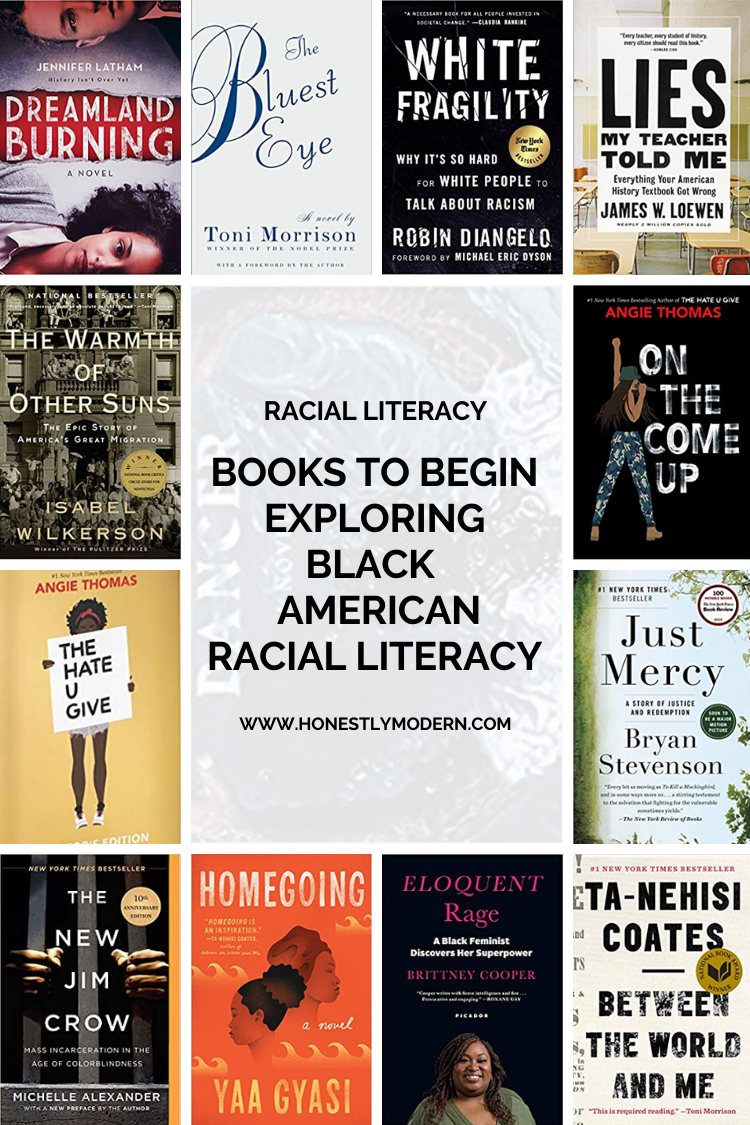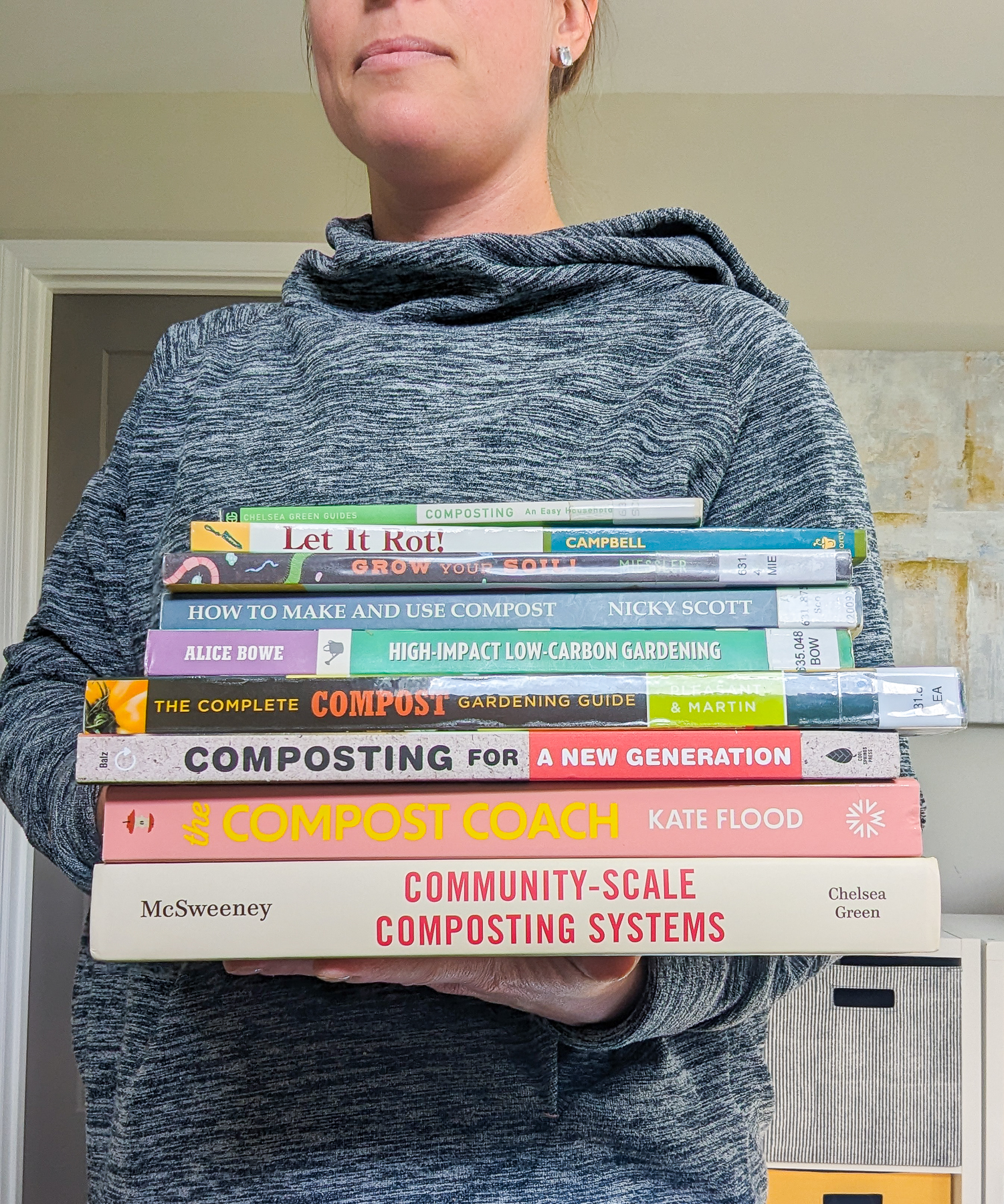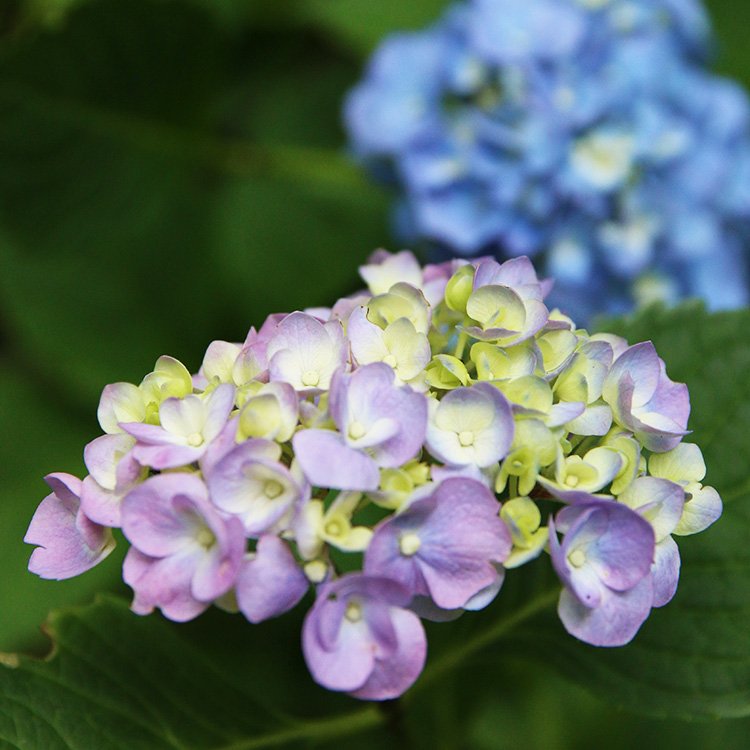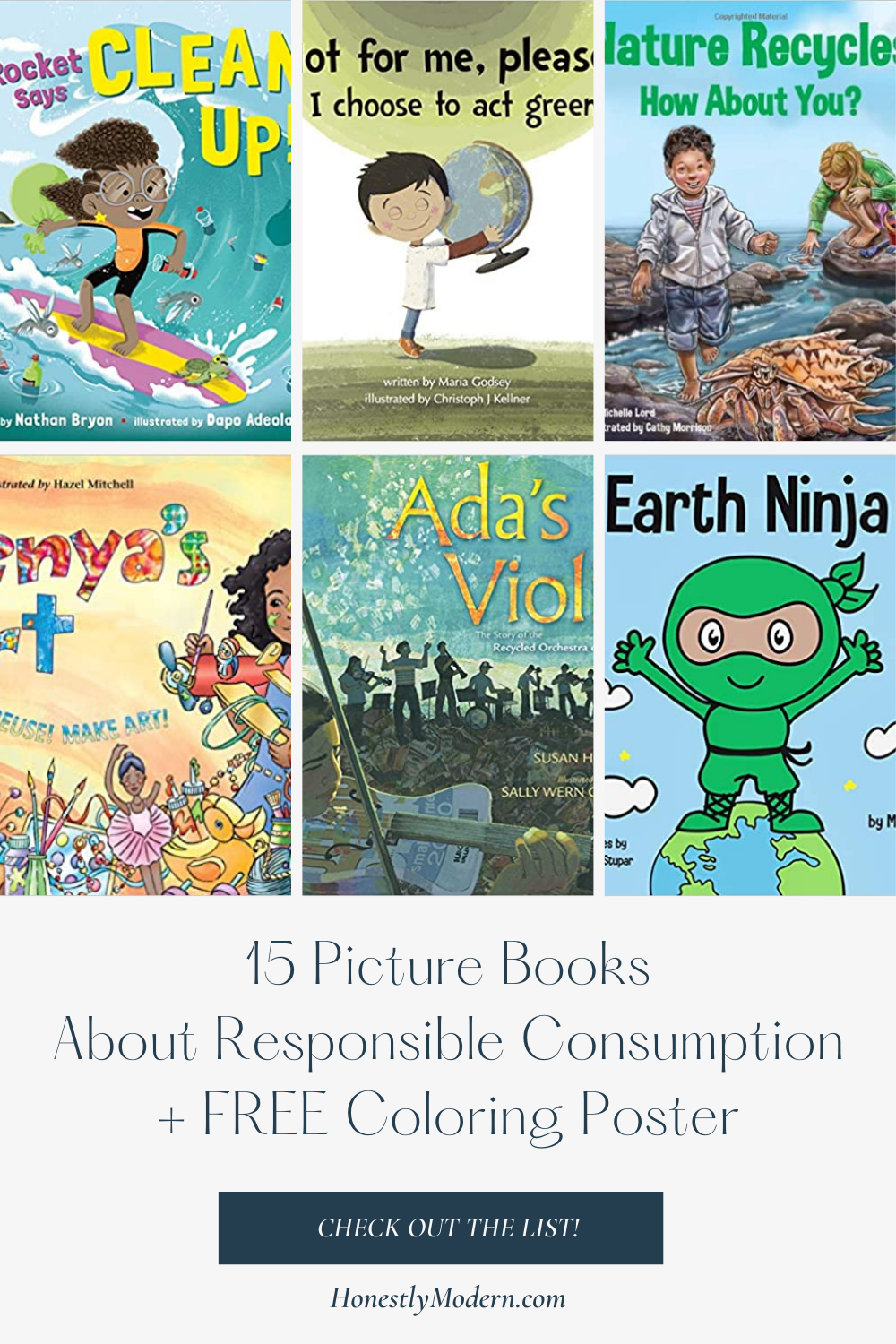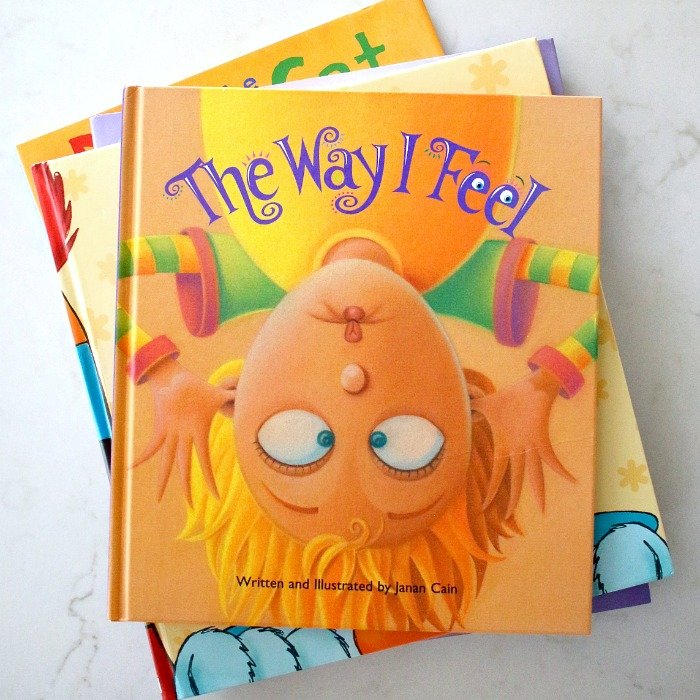Books To Begin Exploring Black American Racial Literacy
Interested in expanding your Black racial literacy? Check out some of these books and learn a bit more about why racial literacy matters to environmental justice.
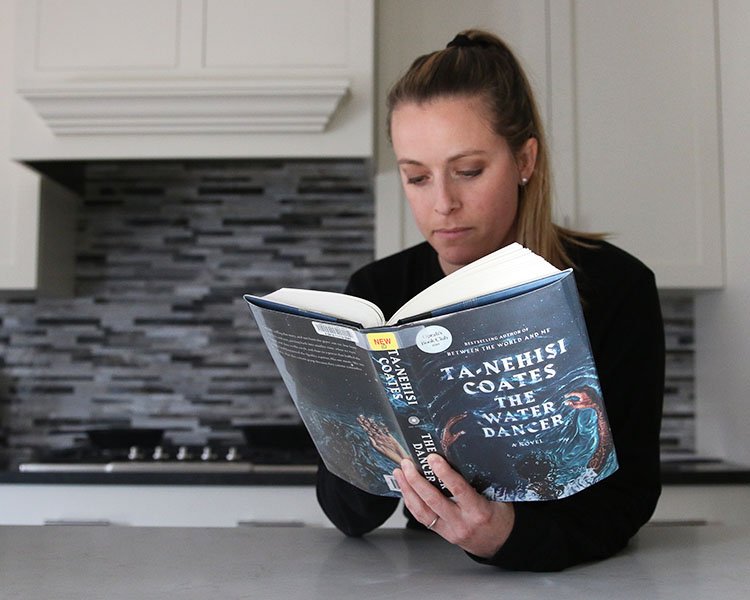
I primarily write about eco-friendly living for modern families, climate action, and other environmental matters. I have dabbled in discussions related to intersectional environmentalism but am not nearly an expert and haven’t shared much about it on the blog. Yet.
Climate action and racial justice are heavily intertwined. Climate change exacerbates inequities between the rich and poor (which in many instances aligns with white and non-whites). Many of the luxuries that wealthy (and often white people) enjoy are the results of slave labor and toxin-laden production processes performed by Black and Brown people.
Effects of climate change such as droughts and floods have a disproportionate impact on Black and Brown people globally. In the United States, landfills, Superfund sites, power plants, and other sources of toxins and pollutants are disproportionately situated in or near Black and Brown communities, even when adjusted for income levels. This is just one component of systematic racism in the United States.
Further, climate action is an enormous issue for which we need all hands on deck to tackle. When non-whites are so unfairly burdened by the pain, fear, and inequity of racism, they have fewer resources to contribute to climate action, understandably.
Intersectional environmentalism is the practice of advocating for environmental and climate action that protects the planet and all people on the planet, regardless of race, ethnicity, gender, or any other defining factor. Because climate change disproportionately impacts Black and Brown people, intersectional environmentalism requires an intentional critique of how climate action movements impact marginalized communities. It requires us to examine how environmentalism and social justice are connected.
Intersectional environmentalism is a more holistic approach to environmental issues than one that doesn’t specifically consider impacts on marginalized communities. There is more to learn and more to consider, particularly outside of our own communities and lived experiences.
I’m still learning about intersectional environmentalism, and part of that education process includes developing greater racial literacy, or an understanding of the lived experiences and racism experienced by marginalized communities. I have gathered up several books for parents (and all adults) specifically related to Black American racial literacy, some of which I have read and others of which are on my ‘to be read’ list.
My Black Racial Literacy Reading List
There are SO many amazing books, fiction and non-fiction, that explain and amplify the lived experiences of those who look different than us. With respect to being Black in the United States, I’ve only scratched the surface of texts available from which to learn. However, I wanted to share a few books that inform Black American racial literacy that I’ve read as well as a few that are on my ‘to be read’ list. (As a side note, there are also lots of resources and books on literacy related to other races and ethnicity. Those were not in scope for my list below but are equally important.)
Some of these books I’ve shared are technical and historical texts while others are realistic fiction windows through which we can see the world from someone else’s perspective. A few of the books are also young adult (YA) books. While we need technical books to help us put experiences into context and provide language to understand Black American racial literacy, I think the fiction books on this list offer another perspective to reflect on lived experiences of Black Americans.
Which Books On Black American Racial Literacy To Read First
If you haven’t read many books on racial literacy, it can feel a little overwhelming figuring out where to start. About three years ago, when I started exploring this topic more intentionally, I know there was so much to learn and it felt like a lot. In that light, I think that if someone was developing a ‘Black American racial literacy curriculum reading list’ for themselves, there are some books that might make sense to read before others.
I am not an anti-racist education expert. I share the lists with you below based just on my own experiences. Maybe they will resonate with you and maybe they won’t. I only hope I can provide some commentary that might make the journey of self-education and self-reflection a little bit easier.
To be clear, I understand that developing racial literacy should not be centered on the emotions or fragility of the reader. We need to do the work to learn and make change, and it will be uncomfortable. My intent in recommending that certain books might be “easier to read” first is simply to suggest that some books build off of others (or at least they did for me).
Much like with math, we don’t jump into calculus before learning about addition and multiplication. There are certain topics that are easier and more logical starting points, and in my experience (for whatever it’s worth) some of the heavy anti-racist work books aren’t always the best place for beginners. They are necessary, but might not be the best place to start.
For example, I found that reading books written by Blacks about their own lived experiences through both fiction and non-fiction created a foundation for my understanding. Direct anti-racist self-reflection and action books built on the understanding and language I learned from the lived experience books. Thus, these more technical and action-oriented books made sense (for me) to read a bit later in my learning process. You may or may not experience the same path of reckoning.
Anti-racism work and using media (books, movies, podcasts, social media, and more) to see the world through others’ eyes is a life-long endeavor. We will never be done with this work, but we have to get started. Hopefully the books I share below will give you a place to get started. The authors of these books are the real anti-racist educators, and they have so much to offer.
I denoted books I have read with an asterisk (*). Generally, I prefer to recommend books I have read because I can vouch for them (of course) and love discussing them with others. However, there are many additional Black American racial literacy books on my list of books I want to read. I wanted to include several others that I hope are educational and engaging and have been recommended by friends or other valuable resources.
Please feel free to share additional recommendations in the comments. This list is anything but exhaustive. I have seen countless book lists on racial literacy and anti-racist work, so I know there are so many books out there not listed below. What are you reading right now to advance your racial literacy?
This list includes affiliate links. These affiliate links have no impact on your purchase price. Where available, I included links to Bookshop.org, an alternative to Amazon that supports local bookstores. Please support the independent bookstores in your community to the extent that you can. If you prefer audiobooks, Libro.fm is another great option for audiobooks that supports local, independent bookstores.
A Note on Buying and Borrowing Books
We include affiliate links to books we recommend. If you purchase through one of these links, Honestly Modern earns a very small commission that has no impact on your purchase price.
If you can find the books from your local library, from a friend, at an independent bookstore, or through a used book shop, those sources are ideal. Using the library is zero waste, saves money, and saves space in your home because you can read all the books without storing all the books on your bookshelves. If you’re not sure of the best way to use your local library, check out these tips to make the most of your local library. With a little exposure, your kids will learn to LOVE the library!
If you prefer to listen to audiobooks, we recommend using Libro.fm, our favorite audiobook app. We’ve tried several audiobook apps and love that Libro.fm supports independent bookstores and offers a great user experience.
Black Americans’ Lived Experiences: Fiction & Non-Fiction
Eloquent Rage by Brittany Cooper*
When Cooper learned of her grandmother’s eloquent rage about love, sex, and marriage in an epic and hilarious front-porch confrontation, her life was changed. This and other life experiences led Brittney to become a fierce feminist.
In this book, Cooper speaks directly to Black women about their power, their right to be really angry, and the force they can be when they own their superpowers. Although the book doesn’t speak to me as a white woman, it is really insightful to have a window into the lived experiences and perspectives of Black women in our communities in such a raw and powerful way.
Between The World and Me by Ta-Nehisi Coates*
Between the World and Me is Ta-Nehisi Coates’s attempt to answer questions about life in a letter to his adolescent son. Coates shares with his son—and readers—the story of his awakening to the truth about his place in the world through a series of revelatory experiences, from Howard University to Civil War battlefields, from the South Side of Chicago to Paris, from his childhood home to the living rooms of mothers whose children’s lives were taken as American plunder. Beautifully woven from personal narrative, reimagined history, and fresh, emotionally charged reportage, Between the World and Me illuminates the past, bracingly confronts our present, and offers a transcendent vision for a way forward.
I listened to this audiobook a couple of years ago and highly recommend it. Ta-Nehisi Coates narrates the book himself, and hearing books like this from the voice of the author are so powerful. The writing is amazing and the narrative so insightful and meaningful to those of us with the privilege of not experiencing the racism ourselves. Definitely read or listen to this book!
The Water Dancer: A Novel by Ta-Nehisi Coates*
Young Hiram Walker, the main character, was born into slavery. When his mother was sold away, Hiram was robbed of all memory of her but was gifted with a mysterious power. This is the dramatic story of an atrocity inflicted on generations of women, men, and children, the violent and capricious separation of families, and the war they waged to simply make lives with the people they loved.
As with all of his work, this is a beautifully written novel that reminds us of the immense pain and inequity slavery caused. It’s such a heartbreaking read and will have you locked in until it’s done. (Further review from me.)
Homegoing by Yaa Gyasi*
Homegoing follows the parallel paths of two sisters and their descendants through eight generations: from the Gold Coast in Africa to the plantations of Mississippi, from the American Civil War to Jazz Age Harlem. Yaa Gyasi’s extraordinary novel illuminates slavery’s troubled legacy both for those who were taken to the United States and those who stayed in Africa—and shows how the memory of captivity has been inscribed on the soul of our nation.
This book was such an amazing way to follow the stories and see the racial injustice of our history that so many history books in school leave out. Although it’s a fictional story, it’s deeply rooted in truths that led us to where we are today. (Further review from me.)
The Hate U Give by Angie Thomas*
Sixteen-year-old Starr Carter moves between two worlds: the poor neighborhood where she lives and the fancy suburban prep school she attends. The uneasy balance between these worlds is shattered when Starr witnesses the fatal shooting of her childhood best friend Khalil at the hands of a police officer. Khalil was unarmed.
Soon afterward, his death is a national headline. Some are calling him a thug, maybe even a drug dealer and a gangbanger. Protesters are taking to the streets in Khalil’s name. Some cops and the local drug lord try to intimidate Starr and her family. What everyone wants to know is: what really went down that night? And the only person alive who can answer that is Starr. Starr must decide what to say or not say about the events that took place and consider how it could affect her family.
This book highlights many inequities and challenges Black teens face just by showing up in life every day. It also is a telling lesson in the impact media has on our perception of people and how limited their view of Black teens can be.
Dreamland Burning by Jennifer Latham*
When seventeen-year-old Rowan Chase finds a skeleton on her family’s property, she has no idea that investigating the brutal century-old murder will lead to a summer of painful discoveries about the present and the past.
Nearly one hundred years earlier, a misguided violent encounter propels seventeen-year-old Will Tillman into a racial firestorm. In a country rife with violence against blacks and a hometown segregated by Jim Crow, Will must make hard choices on a painful journey towards self-discovery and face his inner demons in order to do what’s right the night Tulsa burns.
Through intricately interwoven alternating perspectives, the author ties together the Tulsa race riot of 1921 and the complex state of current US race relations to question how much has actually changed. As we’ve come to see lately, not nearly enough.
Just Mercy by Bryan Stevenson*
The death penalty and mass incarceration have plagued a generation of people, primarily poor and brown, in incredibly unfair ways. Stevenson is an attorney who has made it his mission to change this narrative through his work as a death row defense attorney. The book details a few of his clients over the last couple of decades whose experiences reflect the unfair costs and injustices endured by those who can’t afford to hire the biggest name lawyers to protect their innocence and defend their rights. Our criminal justice system is incredibly unjust, and Stevenson knows firsthand precisely how unfair it can be. (One of the books on this list of books that I loved but also made me mad or sad.)
The Bluest Eye by Toni Morrison*
Pecola Breedlove, a young black girl, prays every day for beauty. Mocked by other children for the dark skin, curly hair, and brown eyes that set her apart, she yearns for normalcy, for the blond hair and blue eyes that she believes will allow her to finally fit in. Yet as her dream grows more fervent, her life slowly starts to disintegrate in the face of adversity and strife. A powerful examination of our obsession with beauty and conformity, Toni Morrison’s virtuosic first novel asks powerful questions about race, class, and gender with the subtlety and grace that have always characterized her writing.
The Fire Next Time by James Baldwin
A national bestseller when it first appeared in 1963, The Fire Next Time galvanized the nation and gave passionate voice to the emerging civil rights movement. At once a powerful evocation of James Baldwin’s early life in Harlem and a disturbing examination of the consequences of racial injustice, the book is an intensely personal and provocative document. It consists of two “letters, ” written on the occasion of the centennial of the Emancipation Proclamation, that exhort Americans, both black and white, to attack the terrible legacy of racism.
On The Come Up by Angie Thomas
Sixteen-year-old Bri wants to be one of the greatest rappers of all time. Or at least win her first battle. As the daughter of an underground hip hop legend who died right before he hit big, Bri’s got massive shoes to fill.
But it’s hard to get your come up when you’re labeled a hoodlum at school, and your fridge at home is empty after your mom loses her job. So Bri pours her anger and frustration into her first song, which goes viral . . . for all the wrong reasons. It is the story of fighting for your dreams, even as the odds are stacked against you; and about how, especially for young black people, freedom of speech isn’t always free.
Ghost Boys by Jewell Parker Rhodes
Twelve-year-old Jerome is shot by a police officer who mistakes his toy gun for a real threat. As a ghost, he observes the devastation that’s been unleashed on his family and community in the wake of what they see as an unjust and brutal killing, and has an unexpected mentor on this journey.
Anti-Racist Research, Science, and Action-Oriented Non Fiction Books
A Terrible Thing To Waste: Environmental Racism and Its Assault on the American Mind by Harriet A Washington *
From injuries caused by lead poisoning to the devastating effects of atmospheric pollution, infectious disease, and industrial waste, Americans of color are harmed by environmental hazards in staggeringly disproportionate numbers. This systemic onslaught of toxic exposure and institutional negligence causes irreparable physical harm to millions of people across the country, cutting lives tragically short and needlessly burdening our health care system. But these deadly environments create another insidious and often overlooked consequence: robbing communities of color, and America as a whole, of intellectual power.
This book chronicles many sources of environmental hazards that have, often knowingly, been allowed to poison water, soil, air, and the bodies of Americans, especially marginalized communities. This book has so much information to absorb and is a great resource to understand why intersectional environmentalism is so important.
Why Are All The Black Kids Sitting Together In The Cafeteria by Beverly Daniel Tatum*
Walk into any racially mixed high school and you will see Black, White, and Latino youth clustered in their own groups. Is this self-segregation a problem to address or a coping strategy? Beverly Daniel Tatum, a renowned authority on the psychology of racism, argues that straight talk about our racial identities is essential if we are serious about enabling communication across racial and ethnic divides.
These topics have only become more urgent as the national conversation about race is increasingly acrimonious. This fully revised edition is essential reading for anyone seeking to understand the dynamics of race in America.
White Fragility: Why It’s So Hard for White People To Talk About Racism by Robin DiAngelo*
Anti-racist educator Robin DiAngelo discusses the phenomenon of white fragility and “allows us to understand racism as a practice not restricted to ‘bad people’” Referring to the defensive moves that white people make when challenged racially, white fragility is characterized by emotions such as anger, fear, and guilt, and by behaviors including argumentation and silence. These behaviors, in turn, function to reinstate white racial equilibrium and prevent any meaningful cross-racial dialogue. In this book, DiAngelo examines how white fragility develops, how it protects racial inequality, and what we can do to engage more constructively.
We Were Eight Years in Power: An American Tragedy by Ta-Nehisi Coates*
In this series of essays written during the Obama presidency, accompanied by Coates’ reflections on those essays at the time he wrote the book, Coates explores the tragic echoes of that history in our own time: the unprecedented election of a black president followed by a vicious backlash that fueled the election of the man Coates argues is America’s “first white president.”
But the story of these present-day eight years is not just about presidential politics. This book also examines the new voices, ideas, and movements for justice that emerged over this period–and the effects of the persistent, haunting shadow of our nation’s old and unreconciled history. Coates powerfully examines the events of the Obama era from his intimate and revealing perspective–the point of view of a young writer who begins the journey in an unemployment office in Harlem and ends it in the Oval Office, interviewing a president.
Lies My Teacher Told Me by James Loewen
Our history classes in school are woefully whitewashed and incomplete. In this book, the author brings to life just how limited our school texts are. Loewen brings history alive in all its complexity and ambiguity. Beginning with pre-Columbian history and ranging over characters and events as diverse as Reconstruction, Helen Keller, the first Thanksgiving, the My Lai massacre, 9/11, and the Iraq War, Loewen offers an eye-opening critique of existing textbooks, and a wonderful retelling of American history as it should—and could—be taught to American students.
The Warmth of Other Suns by Isabel Wilkerson
From 1915 to 1970, this exodus of almost six million people changed the face of America. Wilkerson compares this epic migration to the migrations of other peoples in history. She interviewed more than a thousand people, and gained access to new data and official records, to write this definitive and vividly dramatic account of how these American journeys unfolded, altering our cities, our country, and ourselves.
Wilkerson brilliantly captures their first treacherous and exhausting cross-country trips by car and train and their new lives in colonies that grew into ghettos, as well as how they changed these cities with southern food, faith, and culture and improved them with discipline, drive, and hard work. Both a riveting microcosm and a major assessment, The Warmth of Other Suns is a bold, remarkable, and riveting work, a superb account of an “unrecognized immigration” within our own land.
The New Jim Crow: Mass Incarceration in the Age of Colorblindness by Michelle Alexander
In this book, Alexander outlines the unfair and racist role the justice system plays in our country. Mass incarceration, she argues, is simply a new form of segregation and institutionalized racism that protects white supremacy. This book has spawned a whole generation of criminal justice reform activists and organizations motivated by Michelle Alexander’s unforgettable argument that “we have not ended racial caste in America; we have merely redesigned it.”
Hood Feminism: Notes from the Women That a Movement Forgot by Mikki Kendall*
In her searing collection of essays, Mikki Kendall takes aim at the legitimacy of the modern feminist movement arguing that it has chronically failed to address the needs of all but a few women. Drawing on her own experiences with hunger, violence, and hypersexualization, along with incisive commentary on politics, pop culture, the stigma of mental health, and more, Hood Feminism delivers an irrefutable indictment of a movement in flux. An unforgettable debut, Kendall has written a ferocious clarion call to all would-be feminists to live out the true mandate of the movement in thought and in deed.
How To Be An Anti-Racist by Ibram X Kendi
In How to Be an Antiracist, Kendi takes readers through a widening circle of antiracist ideas–from the most basic concepts to visionary possibilites–that will help readers see all forms of racism clearly, understand their posionous consequences, and work to oppose them in our systems and in ourselves.
Race For Profit : How Banks And The Real Estate Industry Undermined Black Homeownership by Keeanga-Yamahtta Taylor
Race for Profit uncovers how exploitative real estate practices continued well after housing discrimination was banned. The same racist structures and individuals remained intact after redlining’s end, and close relationships between regulators and the industry created incentives to ignore improprieties.
Meanwhile, new policies meant to encourage low-income homeownership created new methods to exploit Black homeowners. As a result, the push to uplift Black homeownership had descended into a goldmine for realtors and mortgage lenders, and a ready-made cudgel for the champions of deregulation to wield against government intervention of any kind.
Evicted: Poverty and Profit in the American City by Matthew Desmond
By following eight families who struggle to keep a roof over their heads, Evicted transforms our understanding of poverty and economic exploitation while providing fresh ideas for solving one of twenty-first-century America’s most devastating problems. Its unforgettable scenes of hope and loss remind us of the centrality of home, without which nothing else is possible.

